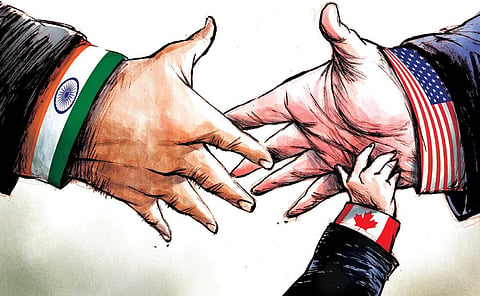Fuming Ottawa clouds Delhi’s ties with Washington
The tensions building up in the Indian-Canadian relationship during the past year have finally boiled over. Something had to give way, as the nationalist lobbies in India have been relentlessly taunting Canadian authorities for their alleged lackadaisical attitude toward the so-called ‘Khalistani’ militants. A point of no return has been reached.
Ottawa has thrown the ball back right into the Indian court, estimating, perhaps, that the vilification campaign against them was orchestrated from Delhi. A senior Indian diplomat has been expelled, whom Canadians named as an intelligence official. The American news organisation National Public Radio, a state-affiliated media, reported that Canada’s national security advisor and chief of spy agency visited New Delhi to “confront” the Indian intelligence agency with incriminating materials.
Prime Minister Justin Trudeau stated in the Canadian parliament on Monday, “Over the past number of weeks, Canadian security agencies have been actively pursuing credible allegations of a potential link between agents of the government of India and the killing of a Canadian citizen, Hardeep Singh Nijjar.” Trudeau added that “Any involvement of a foreign government in the killing of a Canadian citizen on Canadian soil is an unacceptable violation of our sovereignty.” He called on the Modi government “to cooperate with Canada to get to the bottom of this matter”.
What cannot be ignored is that Trudeau spoke after raising the matter personally with US President Joe Biden. And the White House has since come out backing the Canadian government’s investigation. Possibly, the White House knows something we don’t.
Trudeau, who is a thoroughbred politician, surely factored in that this affair has potential to severely damage India’s relations with Canada. Yet he went ahead, but before doing so, he made sure President Biden had his back. We are in the dark about what transpired between Washington and Ottawa who after all have a tight alliance in matters of intelligence sharing and geo-strategy, and are part of the Five Eyes.
Reuters cited a Canadian government source to the effect that Ottawa collaborated “very closely” with Washington to examine evidence indicating potential Indian involvement in Nijjar’s killing. This is an intriguing situation. For, it is nothing but sophistry to reduce Nijjar’s killing to a murder crime or an act of terrorism—and Washington and Ottawa cannot be unaware of it. This is one thing.
No doubt, the White House’s reaction to Trudeau’s remarks is slanted in favour of Canada. “We are deeply concerned about the allegations referenced by Prime Minister Trudeau,” Adrienne Watson, White House National Security Council spokesperson, said. “We remain in regular contact with our Canadian partners. It is critical that Canada’s investigation proceed and the perpetrators be brought to justice.”
Given its sheer sensitivity, the Canadian PM had an option to keep the matter confidential, especially when he could produce no hard evidence to substantiate his grave allegation. On the other hand, the White House waded into the controversy in real time. These are disturbing tell-tale signs. So much for the so-called value-based alliance system led by the US.
Ironically, just a few hours before Trudeau spoke, External Affairs Minister S Jaishankar stated, inter alia, in a TV interview: “I think we need to get over the syndrome of the past that the West is the bad guy and on the other side are the developing countries. The world is more complicated, the problems are much more complicated than that.” How many foreign ministers in the Global South today would have the gumption to say such a thing of the West, as Jaishankar has done?
This is the crux of the matter. With great deliberation, Delhi has been aligning itself closely with Washington on its Indo-Pacific strategy, even risking a fundamental disconnect with the geopolitical reality that a big majority of Asian countries steer clear of it. Yet, India is now all but being branded as a state sponsoring terrorism. Something has gone horribly wrong somewhere in our foreign policy calculus.
Why is there such discontent in the western mind toward India? There are no easy answers. The only plausible explanation could be that the western countries’ praise for India was never real but was principally driven by geopolitical interests and the strategic necessity to lure India into their anti-China alliance. Beyond that would lie a host of tendentious issues in relation to India’s political economy where prudence demanded that they kept their thoughts to themselves pragmatically, while exchanging information and even discussing exclusively between them.
The paradox is that as a key member of the western alliance and a close ally of the US, Canada plays an important role for the US in establishing a so-called rules-based international order and promoting the Indo-Pacific Strategy, which India also partakes of.
However, this morality play will not impact the Modi government’s foreign policy trajectory, or its China-centric thrust, and therefore, the US’ Indo-Pacific strategy will continue to remain a key template. Which means that Delhi will continue to work with the Biden Administration as junior partner.
Also read: Realities of war in Ukraine are sinking in
Besides, Washington expects Delhi to be a bridge between the West and the Global South. Therefore, it cannot be in Biden’s interest to isolate India. If push comes to shove between Ottawa and Delhi, Washington may even step in to calm the troubled waters.
Much will depend on the Canadian government’s investigation. The Sikh community in Canada is sure to keep the controversy in animation. The Canadian government reportedly intends to put in public domain the evidence in its possession at some point.
That said, Canada also has a history of yielding to US interventions on issues where vital American interests are involved. What cannot be overlooked, quintessentially, is that this is also about secessionist activities in a Five Eyes country that threaten India’s sovereignty.
(Views are personal)
M K Bhadrakumar
Former diplomat

